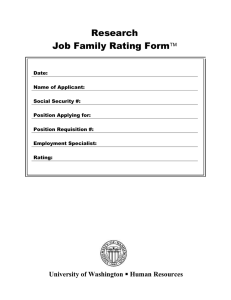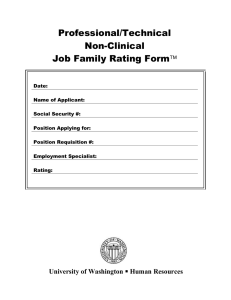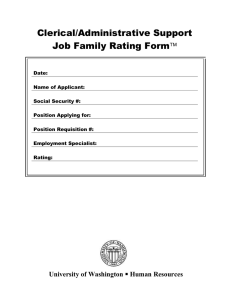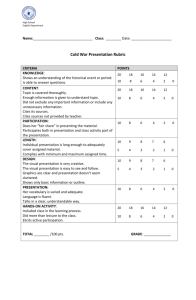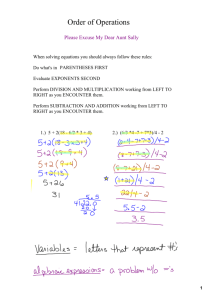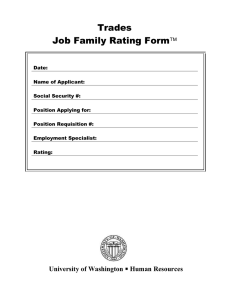Management Job Family Rating Form
advertisement
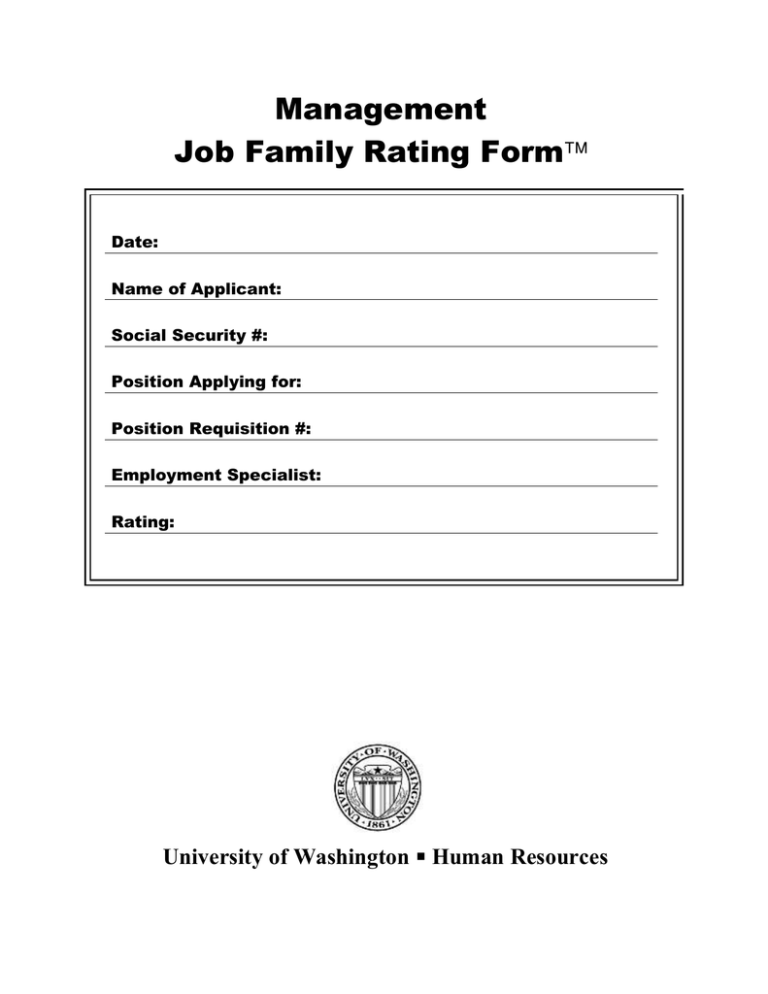
Management Job Family Rating Form Date: Name of Applicant: Social Security #: Position Applying for: Position Requisition #: Employment Specialist: Rating: University of Washington Human Resources Critical Success Factors Performance Management Orientation to Service Can you tell me about a time when you provided excellent customer service by going beyond your primary job responsibilities? Describe a situation when you encountered an irate customer/coworker. Prompts a. b. c. d. Please describe the situation. What action did you take? What was the outcome? Can you provide another example? (repeat a-c)? a. Please describe how you handled the situation. b. What was the outcome? c. If the encounter were to reoccur, would you handle it differently? If yes, what would you do differently? d. What is it like for you to allow the patient or customer to always be right even if you believe that they are not? Anchors • Service encounter is beyond parameters of typical job responsibilities 0 1 • Describes specific behaviors that made the encounter positive 0 1 • Able to identify a second positive encounter beyond parameters of typical job responsibilities 0 1 • Describes specific examples without criticism or blame • Describes specific behaviors (1 pt) and verbal responses (1 pt) used 0 1 2 • Describes positive outcome encounter OR reflective self evaluation, i.e., additional measures that could have been taken to improve the situation 0 1 • Describes a capacity to elevate the emotional need of the patient/ customer above one’s own need and contain the urge to have the “last word” 0 1 • Describes past behavior used in creating an environment for good service 0 1 • Describes system for monitoring service quality Focus groups Customer surveys Mystery shoppers Other 0 1 0 1 Please describe specific strategies that you have used in the past to ensure your area of responsibility is responsive to the needs of customers/patients. a. How did you know that you were meeting or exceeding customer expectations? What are your strengths as a manager? What areas need further development? a. When you have received feedback as a manager, what strengths have been recognized in your performance by supervisors? By subordinates? b. When you have received feedback as a manager, what areas of “needs improvement” have been identified by supervisors? By subordinates? Describe your action plan for addressing those areas that need development? • Describes strengths and development areas in specific terms 0 1 • Cites specific examples of steps taken to improve managerial skills 0 1 Can you recall a time when one of your direct report’s performance was “marginal” but was improved through the performance management process? a. What employee behaviors needed improvement? b. What interventions did you use? c. What did you do to assist the employee in sustaining the change? d. What core beliefs about the nature of human behavior in the workplace govern your management style? Have there been any instances when those beliefs were challenged by the actual behavior of a subordinate? In what ways did this effect your beliefs as a manager? How has your practice been influenced by this? • Describes the specific performance issue 0 1 • Describes specific strategies employed Individual coaching 0 1 • Describes specific measures for monitoring employee performance Use of documentation tools Feedback from other managers Shadowing work performance 0 1 • Response reflects belief that if given the resources and training, most people working in healthcare want to do the right thing 0 1 Can you recall a time that you terminated an employee for poor performance? a. Describe the nature of the performance issue and what strategies you utilized in managing the termination process? • Describes specific nature of performance issue 0 1 • Describes appropriate documentation procedures 0 1 UW HR Rev. 11/02 [mgmt_bif.doc] Cultural Competence Change Management Critical Success Factors Prompts Describe a change that you needed to implement in your Department. The University of Washington is a culturally diverse organization reflected in both our workforce and in the patients we serve. Please describe your past experiences in working in a culturally diverse work environment. a. What steps did you utilize to introduce the change? b. How did your staff react? c. What was the biggest obstacle to the implementation of this change? d. What were some strategies that you used to overcome this obstacle? e. What effect did these strategies have? f. Can you describe the plan that you developed to sustain the change after implementation? g. In retrospect, is there anything that you would have done differently? a. In what ways have you demonstrated your commitment to building an inclusive work environment that values diversity? b. What personal development opportunities have you pursued in the past three years for building your skills in managing a diverse work environment? c. What did you learn from these opportunities? Anchors • Describes nature of change 0 1 • Describes strategies for introducing change Informational sessions Staff education about forces driving change Communication tools, devices (i.e., employee newsletters, bulletin boards, electronic communications, etc.) 0 1 • Describes how he/she engaged others in supporting change 0 1 • Describes outcomes of change 0 1 • Reflective in self evaluation, i.e., how situation could have been handled differently 0 1 • Able to describe past experiences in managing diverse workforce 0 1 • Cites specific hiring/selection strategies for ensuring access by underrepresented populations 0 1 • Cites specific examples of mentoring/coaching staff who are culturally different 0 1 • Cites specific examples of seeking diverse perspectives; modeling behaviors; and/or recognizing impact of decisions on culturally diverse groups 0 1 • Cites specific examples of initiating personal development relative to diversity issues 0 1 What skills/behaviors/attitudes will you bring to this position? What expectations do you have of the UW as a future employer? Communication a. What would you do? b. What would you say? c. What questions might you ask? • Uses grammatically correct English and applies the meaning of words appropriately (1 pt) 0 1 2 3 • Speech reflects a tone and volume appropriate to the situation (1 pt) Role Play • Body language (including eye contact) communicates openness, interest, and willingness to discuss situation (1 pt) Orientation to Service a. What would you do? b. What would you say? c. What questions might you ask? • Immediately stops interaction and directs the staff to an “off-stage” area (1 pt) 0 1 2 3 • Addresses the unacceptability of a staff conflict being played out in front of a patient/customer (1 pt) • Conveys collective responsibility for problem (1 pt) Creative Problem Solving a. What would you do? b. What would you say? c. What questions might you ask? • Coaches the staff members in interpersonal negotiating skills (1 pt) 0 1 2 3 • Accesses additional resources that can render immediate help in resolving the staffs’ needs (1 pt) • Follows up the solution with both staff members (1 pt) Dress Code • Interview attire and personal hygiene consistent with standards of employing unit (1 pt) 0 1 UW HR Rev. 11/02 [mgmt_bif.doc] Scoring I. Behavioral Component II. Role Play Total Points Possible: 29 Total Points Earned: _____ Total Points Possible: 10 Total Points Earned: _____ Total Points Earned Total Points Earned = ________% Score = ________% Score 29 10 Final Score Behavioral ______% Score Plus Role Play _____% Score ___________________________________________ = _______% Final Score 2 29 28 27 26 25 24 23 22 21 20 100% 96% 93% 90% 86% 83% 80% 76% 72% 69% 19 18 17 16 15 14 13 12 11 10 65% 62% 59% 55% 52% 48% 45% 41% 38% 34% 9 8 7 6 5 4 3 2 1 31% 27% 24% 21% 17% 14% 10% 7% 3% 10 9 8 7 6 5 4 3 2 1 100% 90% 80% 70% 60% 50% 40% 30% 20% 10% Comments: Candidate is: Recommended Not Recommended Signature of Employment Specialist:_________________________________________ Date:_________________________ UW HR Rev. 11/02 [mgmt_bif.doc]
